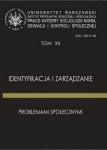Przestępczość młodocianych w okresie transformacji społeczno-ustrojowej w Polsce. Interpretacja zjawiska w świetle ogólnej teorii napięcia Roberta Agn
Juvenile Delinquency in the Period of Social and Political Transformation in Poland; Interpretation of the Phenomenon in the Light of the General Stra
Author(s): Ewa Czerwińska-JakimiukSubject(s): Social Sciences
Published by: Instytut Profilaktyki Społecznej i Resocjalizacji UW
Keywords: general strain theory; juvenile delinquency; Robert Agnew; social and political transformation
Summary/Abstract: The reflections in the paper focus on showing why now, in Poland, juveniles undertake actions which violate legal order, and on presenting these causes in the light of major theses of Robert Agnew’s general strain theory. The theory explains delinquency in terms of social relations which are based on negative attitudes that the individual may adopt towards others. The author of the theory claims that the strain is the state stemming from the existence of negative relations, the presence of influences or relations which are considered by such individuals as unfavorable for them and which they find unwelcomed. Criminal behavior is the consequence of the pressure and takes place under the influence of negative affective states, mainly anger, which are the result of unfavorable relations with others. Moreover, the theory takes into consideration personality and environment as factors stimulating criminal action. The validation of Agnew’s theory on the Polish ground, as applied to the interpretation of juvenile delinquency, was positive. The theory may be helpful in explaining both qualitative and quantitative changes in the delinquency among young people as well as other forms of social pathologies (drug or alcohol addiction).
Journal: Prace Katedry Socjologii Norm, Dewiacji i Kontroli Społecznej
- Issue Year: 2011
- Issue No: 12
- Page Range: 101-126
- Page Count: 26
- Language: Polish

